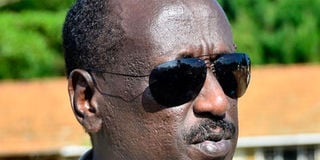Let’s debate but not fall for Gen Saleh’s false choice

Gen Salim Saleh
What you need to know:
- False. The general’s “painful choice” is actually a false choice. We should not fall for it. We can create jobs for our youth and still conserve the environment.
- We do not have to choose one over the other. We do not need to further endanger a lake, already in anaemic health.
Uganda desperately needs jobs for its fast growing youth population. And the way Gen Salim Saleh sees, it the country should go all out to find those jobs. That includes sticking it to the environment.
The general’s mantra goes: save the environment and create joblessness. Or better still: create jobs and trash the environment.
Gen Saleh’s outburst last month was in frustration. Local leaders, led by the remarkable Wakiso District chairman Lwanga Bwanika, and environmentalists were the target of his fire and ire. They are challenging the Chinese and other well-connected Ugandans for trashing Lake Victoria through unmitigated mining of sand on the shorelines and related spots sensitive to the health of the great freshwater water body.
Gen Saleh says those concerns are frivolous because some of the sand is being used to build a job-creating industrial park he is championing at Namunkekera in Nakaseke District.
The media reported Gen Saleh as saying that Uganda must make a “painful choice to either allow sand mining to facilitate industrialisation or allow its citizens remain jobless”.
The general’s “painful choice” is actually a false choice. We should not fall for it. We can create jobs for our youth and still conserve the environment. We do not have to choose one over the other. We do not need to further endanger a lake, already in anaemic health, that sustains more than 40 million East Africans just to create a few jobs in Uganda.
To choose would be to admit failure on a grand scale — failure at the level of basic policy formulation and execution and failure of the imagination. Maybe that’s what Gen Saleh, who has been a powerful national player for decades, is admitting to. That is a pity.
What now?
There is the perennial story of fixing agriculture (for example through increasing productivity, improving post-harvest handling) and agro-processing and linking everything to foreign markets. Yes, we need to export to get those dollars to expand our enterprises to create even more jobs. Somehow, not much gets done. Maybe Operation Wealth Creation, which Gen Saleh commands, will deliver us. We wait.
The current push for local content is good. It has come a little late in the day, but it is welcome nonetheless. Uganda is in the midst of arguably the largest civil works construction boom in its history. From roads and dams and bridges and power stations to airports and industrial parks (and soon railways, oil pipelines and refineries), it is all happening. These things should be creating gazillions of jobs. They are not because we are not skilled enough and our businesses are not financially and technologically sound.
Which makes “skilling” Ugandans inside the normal school structure and outside of it all the more urgent. Is the government prepared to demonstrate that sense of urgency?
To fail to do the hard work means we resort to the easy stuff, damn everything else including the environment. But an unhealthy environment ultimately begets an unhealthy population. As a revolutionary soldier and freedom fighter Gen Saleh surely appreciates the notion of solidarity. We cannot satisfy our urgent needs today at the expense of Ugandans who will be here in 100 years.
It would be a shame if the musings of Gen Saleh, presidential brother and key power broker, discouraged the work of environmentalists.
Regardless, the debate is on. Let’s engage, but never forgetting that employment health and environmental health can and should co-exist.




